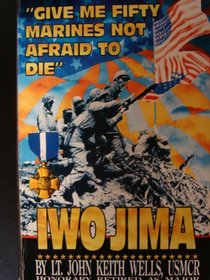A very interesting book from a platoon commander's perspective. It follows John Wells from his college days through training and the first days on Iwo Jima and his time in hospitals.
I have a little problem with his being able to remember almost every second of his time on Iwo Jima, as he wrote the book in 1995 - forty years later. But then I remember a bullet that went by my face in Viet Nam and I can still remember the sound of it over 40 years later.
Wells comes across as somewhat of a maverick in his attitude and actions. After also serving as a lieutenant in the Marine Corps, I can somewhat accept this. However, some of his ideas, such as not eating or drinking while in combat, seem obviously stupid.
And I wondered about his attitude toward Japanese Americans that he expresses a number of times in the book. He fully believes that the first generation of immigrants of these people really hated the United States and white people and were supplying Japan with military information and committing sabotage. Yet at one time he had a Japanese American girl friend. If some first generation Japanese immigrants did actively support Japan, the numbers were far less than first generation German immigrants did. Remember, there was an active German Bund in the U.S. that totally supported the Nazis. Plus, the overwhelming loyalty of Japanese Americans was well established by 1995 and the rumors of their disloyalty, from early WW II, have been disproven again and again.
Wells knew Ira Hayes, the American Pima Indian who helped raise the second flag on Iwo. Yet for some reason, he relates how Ira died soon after war and before he returned to the Indian reservation. This is incorrect and I wonder how Wells made such a mistake. This also leads me to wonder about his other memories of what happened in the war.
Still, his account of his days spent on Iwo are thrilling and very educational to those who wish to understand the nitty-gritty of Pacific island combat.
I have a little problem with his being able to remember almost every second of his time on Iwo Jima, as he wrote the book in 1995 - forty years later. But then I remember a bullet that went by my face in Viet Nam and I can still remember the sound of it over 40 years later.
Wells comes across as somewhat of a maverick in his attitude and actions. After also serving as a lieutenant in the Marine Corps, I can somewhat accept this. However, some of his ideas, such as not eating or drinking while in combat, seem obviously stupid.
And I wondered about his attitude toward Japanese Americans that he expresses a number of times in the book. He fully believes that the first generation of immigrants of these people really hated the United States and white people and were supplying Japan with military information and committing sabotage. Yet at one time he had a Japanese American girl friend. If some first generation Japanese immigrants did actively support Japan, the numbers were far less than first generation German immigrants did. Remember, there was an active German Bund in the U.S. that totally supported the Nazis. Plus, the overwhelming loyalty of Japanese Americans was well established by 1995 and the rumors of their disloyalty, from early WW II, have been disproven again and again.
Wells knew Ira Hayes, the American Pima Indian who helped raise the second flag on Iwo. Yet for some reason, he relates how Ira died soon after war and before he returned to the Indian reservation. This is incorrect and I wonder how Wells made such a mistake. This also leads me to wonder about his other memories of what happened in the war.
Still, his account of his days spent on Iwo are thrilling and very educational to those who wish to understand the nitty-gritty of Pacific island combat.




